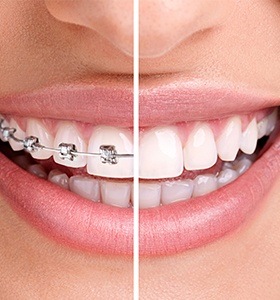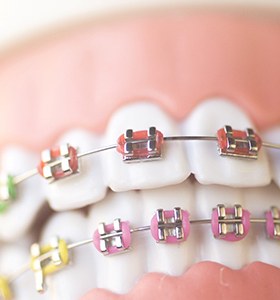
Traditional Braces – Jacksonville, FL
Reliable, Durable & Trusted for Decades
 Actual Patient
Actual PatientDespite all the advances in dentistry over the years, traditional metal braces are still the most effective orthodontic option when it comes to correcting misaligned teeth and crooked bites. They are ideal for younger patients because of their durability, but they can also help adults who are looking for a guaranteed way to straighten their smile. Whether for your child or yourself, Dr. Holland is ready to design a personalized treatment plan that will yield beautiful results before you know it.
Why Choose Ortega Orthodontics for Traditional Braces?
- Orthodontist Born, Raised, & Educated in Jacksonville
- Able To Help Children & Adults Alike
- 1 Of Only 10 Dentists Dual-Certified in Both Orthodontics & Prosthodontics
How Traditional Braces Work

Traditional braces, just like many other orthodontic treatments, work by applying a consistent force to the teeth in order to slowly shift them into the proper positions. Whether you are dealing with crowded teeth, gaps between teeth, crooked or rotated teeth, or a severe bite alignment issue, traditional braces can make it possible to see a new and improved smile.
Dr. Holland will use a specially bent wire to place over each row of teeth. The wire is then held in place using brackets that are bonded to each tooth. The wire will need to be adjusted and tightened from time to time as the teeth move, but eventually, they should all line up as intended to create a more attractive and functional smile.
How Long Do Braces Take?

On average, the normal treatment time for braces is about 24-36 months, though each patient’s situation is slightly different. During your consultation with Dr. Holland, he will discuss your personalized treatment plan, including the estimated timeframe it will take to achieve your desired results.
While many factors can dictate the length of treatment, diligently following Dr. Holland’s instructions might mean completing treatment in much less time.
Will Having Braces Put on or Adjusted Hurt?

In the beginning, you can expect some oral soreness, especially since your mouth will be trying to adjust to the new metal brackets and wires. These small additions to the surfaces of your teeth can irritate your soft oral tissues (i.e., lips, cheeks, gums), so you might want to invest in dental wax, which can serve as a barrier between the bracket and your soft tissue.
Also, each time you go in for a regular dental appointment and have your wire adjusted, you can expect to experience some minor discomfort in the following days. Although this is completely normal and signals that your teeth are, in fact, moving as they should, an over-the-counter pain reliever, soft foods, and a cold compress can help to minimize discomfort.
Understanding the Cost of Traditional Braces

When learning you need orthodontic treatment, your first question might be, “Can I afford braces?” Don’t worry, this is a common inquiry most patients ask during their consultation. Fortunately, Dr. Holland at Ortega Orthodontics has the perfect answer that will ease your mind and have you releasing your tightened grip on your wallet. While no treatment is identical because the severity of every patient’s dental problem is different, there are various ways you can receive the care you need without emptying your bank account. To find out more about how much you can expect to spend on your traditional braces, contact us today.
What Factors Determine the Cost of Traditional Braces?

So, exactly how much are braces? No two patients are alike, which means that even two individuals receiving traditional braces will most likely not pay the same price. Why is this? Allow us to explain:
Various factors must come into play when providing a cost estimate for treatment. Some of these include:
- The type of problem that is occurring and its severity (i.e. overcrowding, bite alignment, gapped or crooked teeth, etc.)
- Whether a full set of braces are needed or a partial set to address only those teeth that are visible
- Length of treatment
- Whether additional orthodontic devices are needed (i.e. palate expander, rubber bands)
- The retainer you will need at the end of treatment
Are Traditional Braces Worth the Investment?

Yes! Traditional braces are considered to be one of the most tried and true methods of orthodontic treatment. Using metal brackets and wires, you will notice a dramatic difference in the way your smile looks and feels throughout treatment, and you will also possess a greater boost in confidence!
Traditional braces offer many benefits, some of which are:
- Improved appearance
- Better oral health by addressing a common dental problem
- A great way to express your personality, especially if you are a child or teen who wants to add a bit of color to your brackets
Will Dental Insurance Cover Treatment?

You will need to check with your dental insurance provider to find out if they cover orthodontic treatment. While some agree to pay for a percentage, it may come with an exclusionary clause that dictates which type of braces are covered. Fortunately, most insurance companies recognize traditional braces as a necessary form of treatment and will agree to pay a portion of the cost.
However, whether you are uninsured or still need assistance paying the remaining amount after your claim has been filed with insurance, our team at Ortega Orthodontics can provide help in identifying alternative solutions that will allow you to stay within your budget by enrolling in a flexible payment plan.
How to Get Started
 Actual Patient
Actual Patient
To get in contact with our orthodontic office and schedule a consultation to learn what your particular treatment will be like, give us a call today. We’ll be happy to answer all of your questions and even discuss how we can use your dental insurance to help you save on your treatment.
Traditional Braces FAQs

Whether you are preparing to begin your journey with braces or are still considering your options when it comes to addressing your crooked teeth or a misaligned bite, Dr. Holland and his team at Ortega Orthodontics want you to be well-informed. Understanding the process, benefits, expectations, and results you will receive can help you make a confident decision about the future of your oral health. Below are some of the most commonly asked questions about braces, which have been compiled by our team. Should you have additional concerns or questions, we invite you to contact our office.
Will it be painful to wear braces?
Whether you’ve worn braces in the past or know someone who has, you will likely learn that braces can cause some level of discomfort. The reason is that the wire must be tightened every few weeks in order to keep your teeth moving in the proper direction. Each time Dr. Holland adjusts your wire, you may feel some pain in the following days. Taking an over-the-counter pain reliever and using a cold compress can help to minimize discomfort. It also helps to eat soft foods during this time to prevent additional pressure being placed on your teeth.
Will my teeth be damaged as a result of wearing braces?
Metal brackets and wires will not damage your teeth; however, if you forgo proper oral hygiene while wearing braces, you could face serious dental problems. No one wants to receive treatment for tooth decay, cavities, or gum disease while wearing braces, which is why you should remain diligent with your dental hygiene routine. This should include:
- Brushing your teeth for two full minutes
- Flossing at least once a day
- Rinsing with an ADA-approved antimicrobial mouthwash
Our team will be happy to recommend helpful products and instruments you can purchase to maintain a healthy smile while wearing braces.
Will I need to wear a retainer when I’m finished with braces?
Yes, you will most likely be required to wear a retainer once it is time to remove your braces. The reason is that your teeth can move quickly, and if there is nothing keeping them in place, they will shift back into their original position.
Dr. Holland may suggest that you wear it full time in the beginning; however, you will gradually begin to wear it only at night after several months.
Can I expect my dental insurance to cover the cost of my braces?
This depends on your individual insurance company and chosen plan. While some do not cover the cost of orthodontics, others may be happy to provide some level of coverage for traditional braces. If you need assistance in contacting an insurance representative, we will be happy to work on your behalf to help you get the answers you need.
Whether your insurance company agrees to cover your braces or not, we will be happy to assist in identifying additional payment methods you can use to stay within your budget while working toward a new and improved smile.